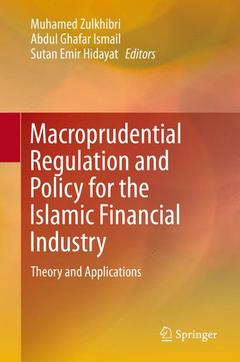Macroprudential Regulation and Policy for the Islamic Financial Industry, Softcover reprint of the original 1st ed. 2016 Theory and Applications
Coordonnateurs : Zulkhibri Muhamed, Ismail Abdul Ghafar, Hidayat Sutan Emir

This volume aims to discuss the current research, theory, methodology and applications of macropreudential regulation and policy for the Islamic financial industry. Published in cooperation with the Islamic Research and Training Institute (IRTI), this book features contributions from a workshop presented in collaboration with the University College of Bahrain (UCB) in Manama, Bahrain, aimed to bring together experts in Islamic banking and regulation and financial economics. This resulting book sheds light on how macroprudential policy may be implemented in the Islamic financial system, and indicates current challenges and their effects on economic growth, financial stability and monetary regulation.
Macroprudential policy is increasingly seen as a way of dealing with the different dimensions of systemic risk. But many central banks, bank supervisors and regulators have limited experience with macroprudential tools, particularly in the Islamic financial industry. Given the complementarities between monetary policy and financial stability, it appears that central banks would always play an important role in macroprudential policy. But how should macroprudential policy best interact with monetary policy? It is becoming more pressing for the central banks to conduct monetary policy in which its conventional banking system operates side by side with Islamic banking system. This question has received increasing attention in the research literature but there is much we still need to learn. This is why new insights from research on macroprudential policy ? which has gained important impetus in recent years ? are so valuable. Featuring contributions on topics such as macroprudential regulation, policy, tools and instruments; governance, systematic risk, monetary policy, and bank leverage, the editors provide a collection of comprehensive research covering the most important issues on macroprudential policy and regulation for the Islamic financial industry. This volume is expected to be a significant contribution to the literature in the field of Islamic finance and evaluation of public policies to promote the development for Islamic financial industry. It is also served as a key text for students, academics, researchers, policy-makers in the field of Islamic finance.
Dr. Muhamed Zulkhibriis a Senior Economist at Islamic Research and Training Institute, Islamic Development Bank, Saudi Arabia with years of progressive experience in the Central Bank of Malaysia and policy-oriented institutions. He involved in developing countries partnership strategy, undertaken research projects and advisory works with other development and policy-oriented institutions globally. He has authored extensively on Monetary Economics, Financial Institutions and Markets, Finance and Economic Development, Islamic Economics and Finance, with more than 80 research articles in leading academic journal, regulatory publication, industry report and the financial press. He has been invited to speak at many international conferences and he has lectured for under- and post-graduate program at the University of Nottingham, U.K and University Putra Malaysia. He earned a Ph.D in economics from University of Nottingham, United Kingdom.
Dr. Abdul Ghafar Ismail is the Head of Research division, Islamic Research and Training Institute, Islamic Development Bank and a professor of banking and financial economics at the University Kebangsaan Malaysia. He is on leave from School of Economics, University Kebangsaan Malaysia. He has been lecturing at the university since 1987 on economics and finance courses such as money and banking, financial economics, advanced macroeconomics, Islamic economics system, money and capital market in Islam and international finance; Islamic banking; money, zakat and the real economy; risk management in Islamic banking; Islamic financial management. His specialization is in the area of Islamic economics and finance. He has a Ph.D in economics from the University of Southampton, United Kingdom.Dr. Sutan Emir Hidayatis the Head of Business Administration Department at University College of Bahrain, Bahrain. He has presented research papers at reputable international conferences such as the IRTI co
Presents the current academic and policy research, theory, methodology and applications of macroprudential regulation and policy in the Islamic financial industry
Features contributions from a workshop presented by Islamic Research and Training Institute (IRTI) in collaboration with University College of Bahrain (UCB) in Manama, Bahrain
Provides a collection of comprehensive research covering the most important issues and challenges on macroprudential policy and regulation for the Islamic financial industry
Includes supplementary material: sn.pub/extras
Date de parution : 06-2016
Ouvrage de 272 p.
15.5x23.5 cm
Disponible chez l'éditeur (délai d'approvisionnement : 15 jours).
Prix indicatif 105,49 €
Ajouter au panierDate de parution : 05-2018
Ouvrage de 272 p.
15.5x23.5 cm
Disponible chez l'éditeur (délai d'approvisionnement : 15 jours).
Prix indicatif 105,49 €
Ajouter au panier


